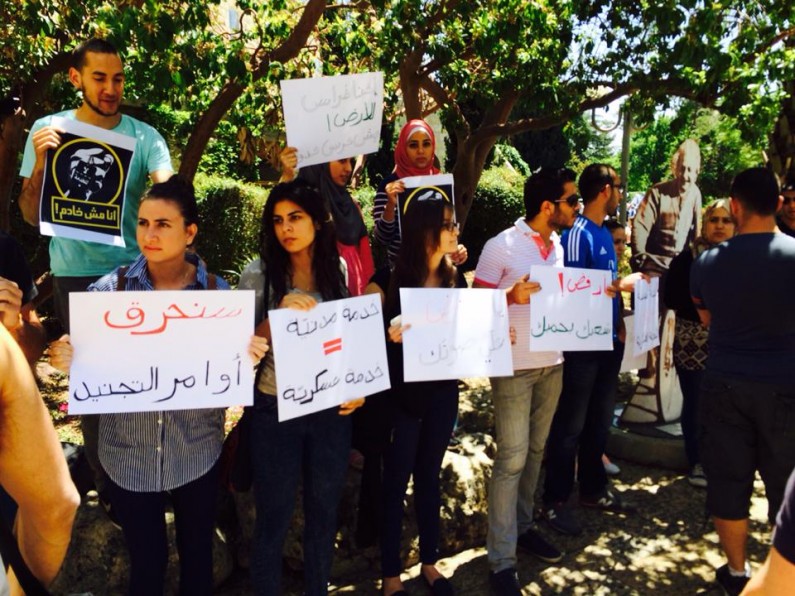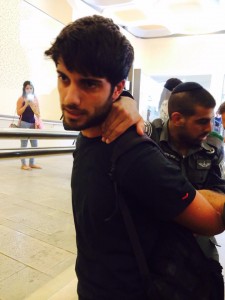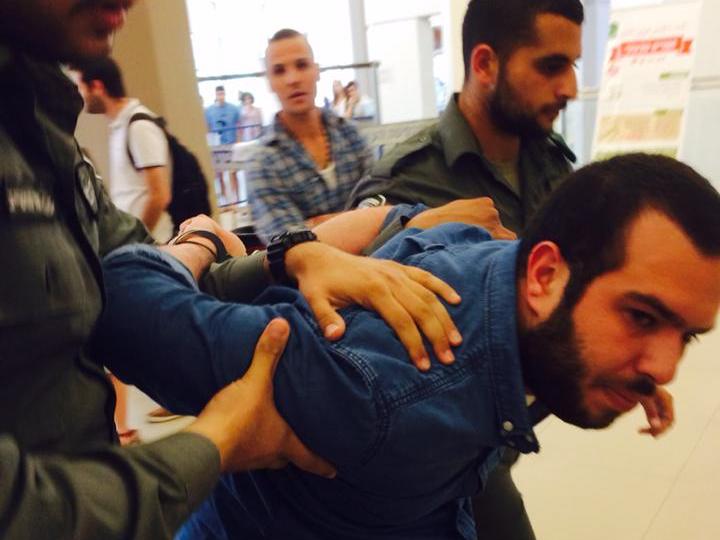
EAST JERUSALEM, occupied Palestinian territory — Farah Bayadsi lifted up the sleeve of her shirt to show a black-and-blue handprint on the inside of her left arm, a bruise inflicted by an Israeli police officer who arrested her last week.
The officer grabbed her aggressively, Bayadsi, 23, told MintPress, although “I knew I wasn’t doing anything wrong.”
Bayadsi, a lawyer and graduate student of human rights and international law at the Hebrew University in Jerusalem, was one of three students who were arrested during a campus protest on the afternoon of Tuesday April 29.
Approximately 20 students – mostly from the minority of Palestinians who hold Israeli citizenship – had assembled for a silent protest against Israel’s ongoingefforts to conscript Palestinian citizens from the Christian religious community into its military.
Israel’s parliament, the Knesset, recently passed legislation differentiating between Christian and Muslim Arab citizens for representation in a national employment commission – a move that has been roundly denounced by Palestinian religious and political groups in Israel.
A statement released by 18 Palestinian NGOs in Israel decried the legislation as “sectarian” and “seek[ing] to fragment the original people of the land into small groups with narrowed identities to replace their national identity.”
Palestinian-organized protests and political events are regularly suppressed on Israeli campuses, where students from the country’s Arab minority complain of systematic discrimination.
A report by the Arab Culture Association documented dozens of similar instances of discrimination against Palestinian students on Israeli campuses in 2011 and 2012.
Calling Israeli universities increasingly “militarized,” the report concluded that “academic institutes have evidently limited the freedom of expression of Arab students and groups and function as research centers for the projects of the Israeli army.”
Excessive force
Following the protest at Hebrew University, the administration subsequently released a statement saying that the students had failed to attain the proper permits to hold an event on campus.
Yet the three students accused the police of using excessive force while arresting them.
Pointing to her bruises, Bayadsi explained that she “decided not to go to the hospital in the end” because of a lack of time after being excessively interrogated.
Upon arriving they were confronted by right-wing students from the Im Tirtzu group, a right-wing Zionist organization thathas been described as “fascist” by many Israelis.
“The Im Tirtzu students started yelling at us,” she said. “They tried to provoke us by saying they used to be soldiers… and were insulting us and cursing.”
The university’s statement claimed that “they refused security officers’ request to identify themselves and leave.”
But according to Bayadsi, they were confronted before they began the protest by university security officers — some were dressed in civilian clothing — who surrounded the protest, began pushing them, and demanded to see their identification cards and student cards.
“When we noticed that they were trying to intimidate us into not protesting, we immediately began the protest,” she recalled. “The protest was silent. We were not yelling or in anyone’s way… we were just holding signs against the conscription [of Palestinian Christians into the military].”
Police officers showed up and first arrested Majd Hamdan, 23, and Khalil Garra, 21. After Bayadsi tried to photograph them being arrested, she attempted to leave when one of the security guards told a police officer to apprehend her.
“He grabbed me hard and squeezed the back of my arm… then pushed me into the police car,” Bayadsi said, where her comrades were already sitting handcuffed.
“Double standard”
The three were subsequently taken to a nearby police station for interrogation.
“When we got to the police station, there was racist talk,” she said. “They were asking us about our religion and and why we care about whether Christians or not serve [in the military].”
Bayadsi requested that the interrogation be conducted in Arabic, a right guaranteed under Israeli law, but before honoring her request a police officer yelled at her and complained that she was purposefully trying to make the process difficult.
Although the three refused to answer any questions, interrogators allegedly tried to coerce each of the students into speaking by saying that the others had already given up information about them.
It was the fifth time Hamdan, an undergraduate student studying computer sciences, was arrested for activism. Four of those arrests took place on campus grounds or nearby: twice during protests against Israel’s November 2012 war on the Gaza Strip and once during a solidarity demonstration for released Palestinian prisoner Samer Issawi’s 266-day hunger strike.
The university administration later emailed the students and informed them that their campus political organization, a student wing of Balad, a Palestinian political party in Israel, was suspended. “But the protest was organized by a lot of Arab students,” Bayadsi explained. “They weren’t all from Balad.”
Nadim Nashif, director of Baladna, a Haifa-based group that advocates on behalf of Palestinians in Israel, explained that Israeli university administrations and police respond differently to protests organized by Palestinian students and those by their Jewish Israeli compatriots.
“For sure there is a double standard for how the universities and the police treat Jewish Israeli students who protest and how they react to Palestinian students who do the same thing,” Nashif told MintPress.
Repressive campus environment
An estimated 1.5 million Palestinian citizens of Israel – around 20 percent of the total population – live in cities, towns, and villages across the country. They suffer from dozens of discriminatory laws that limit their political freedoms, access to state resources, and access to land, according to Adalah – Legal Center for Arab Minority Rights in Israel.
Against that broader backdrop, Palestinian and Israeli human rights groups regularly describe a repressive atmosphere for Arab university students.

According to Baladna’s Nashif, Palestinian students are not strangers to intimidation and discrimination.
“Israeli universities are quick to act against any political statements or actions by Palestinian students,” Nashif explained. “This is not surprising actually. It’s repetitive in places like the Hebrew University and Haifa University.”
In recent years, Palestinian students have faced problems while commemorating the Nakba(Arabic for “catastrophe”), or the expulsion of hundreds of thousands of Palestinians ahead of Israel’s 1948 establishment.
Most recently, Tel Aviv University (TAU)cancelled a speaking event organized by left-wing Palestinian student groups for Monday April 7.
Mohammad Kana’aneh, a prominent Palestinian political leader who was imprisoned by Israel for more than four years, was banned from entering the campus to speak about Land Day, the 1976 killing of six Palestinian citizens of Israel during protests against land confiscation.
The cancellation took place despite the students having applied for and received permission from TAU’s administration.
Like last week’s events at Hebrew University, hundreds of Jewish Israeli protesters from the Im Tirtzu movement had staged impromptu protests – ostensibly lacking prior permission from the administration – against Kana’aneh’s lecture. Students said the Im Tirtzu demonstrators evoked racist language and cursed at them.
“Silencing Arab voices” in Jerusalem
Saying that anti-Palestinian discrimination is indeed pervasive in academic institutions across Israel, Majd Hamdan observed it is considerably worse for students who study at Israeli schools in Jerusalem.
“In the end, these racist policies and practices are about silencing Arab voices on campus and elsewhere,” said Majd, adding that they “are exceptionally clear in Jerusalem. They do not want us to be a part of the Palestinian struggle in Jerusalem.”
Hamdan and Bayadsi intend to continue their student activism. A protest against last week’s arrests is scheduled to take place at Hebrew University this upcoming Wednesday.
“We want to keep up our struggle so that other students join and don’t feel afraid here,” Bayadsi concluded. “In a university there shouldn’t be violence and hitting. The university should protect its students and ensure their safety.”


